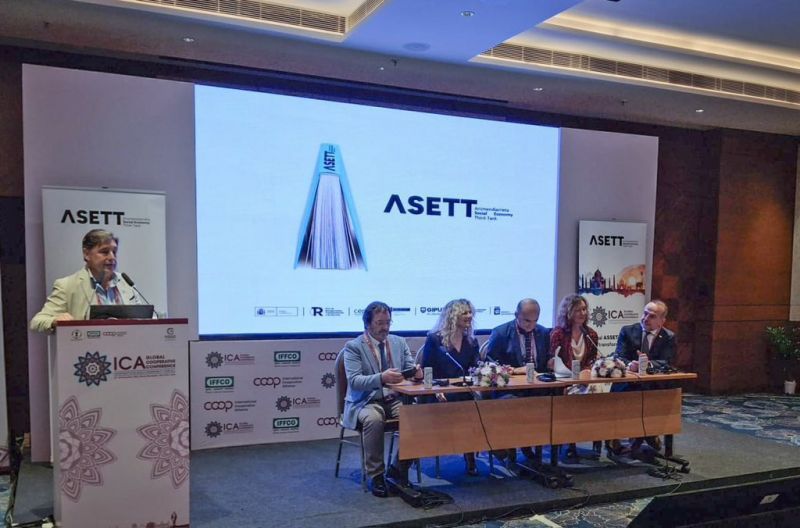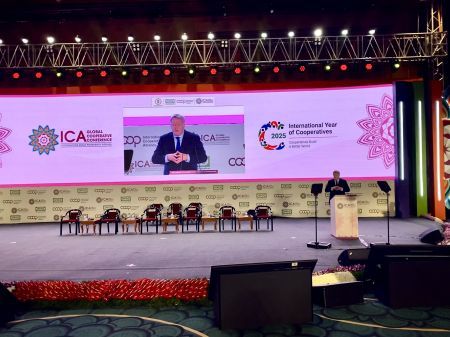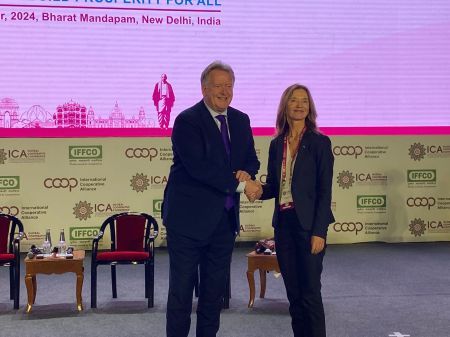
A new social economy think-tank aiming to create more cooperatives and social economy actors was launched at the ICA Global Conference in New Delhi.
The Arizmendiarrieta Social Economy Think Tank (ASETT) brings together the Basque and Spanish governments, cooperatives and academics.
“It’s called a think-tank, but it’s more a do-tank,” said Iñigo Albizuri, Global Head of Public Affairs at MONDRAGON Corporation, President at CICOPA and MUNDUKIDE and ICA Board member.
The think-tank aims to put ideas into practice. In addition to studying the role of social economy enterprises in reducing inequalities and fostering inclusion of labour, the think tank will put ideas into practice, connecting universities, enterprises and institutions in Spain and around the world.
ASETT was brought to life through €1.5m in funding from the Spanish Government.
Amparo Merino, Secretary of State for Social Economy, Government of Spain, explained how the Spanish government is promoting the social economy via a Social Economy Ministry, a Social Economy Vice President, A Social Economy Secretary of sState, a Social Economy Commissioner, and a Social Economy General Director.
“ASETT will position the Spanish Social Economy as a reference at global level,” she said.
“Cepes has a history of know-how,” said Leire Muguerza, Vice President, CEPES. “It’s a cooperation project to create a global centre to teach about and show the social economy’s impact to build a better world together,” she added.
“The Basque Country is a world reference when it comes to worker co-ops and the social economy,” said Jokin Diaz, Social Economy Director, Basque Government.
The High Council of Basque Cooperatives, whose primary function is to promote co-op and cooperate with public sector bodies, is another project partner.
“Today is a great day because there is another entity created with these characteristics, co-ops must lead the social economy because a better world is possible,” said the council’s President, Patxi Olabarria.
Also contributing their knowledge and experience are Spain’s worker cooperatives. “We cannot speak of a space of knowledge for the social economy or of Arizmendarieta if and not mention worker co-ops,” said Luis Miguel Jurado, the President of COCETA, Spain’s worker cooperative federation.
The new think tank will work closely with academic institutions. “The cooperative movement lost the battle of ideas in the 20th century, it’s time to shift that around,” said Dr Sonja Novkovic, a professor of economics at Saint Mary's University, and academic co-director in the Co-operative Management Education programme at the Saint Mary’s University in Canada.
Spanish cooperatives in the health sector cooperatives are already working closely with the university, added Dr Carlos Zarco, the president of the International Health Cooperative Organisation (IHCO).
Describing Japan’s experience in the social economy sector, Osamu Nakano said his country had a lot to learn from ASETT but could also share its experience in the cooperative sector, particularly around legislative changes, since Japan amended its worker cooperative law in recent years.
“ASSET will aim to conduct research for the sector and from the sector,” explained Saioa Arando, from Mondragon University. She added that researchers are criticised for being too theoretical and disconnected from reality. “Doing research starting from the real business is the great strength of ASETT,” she added.




